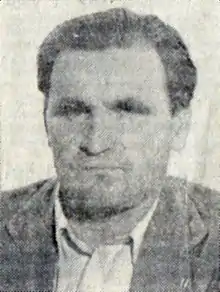Albin Siwak
Albin Siwak (January 27, 1933 – April 4, 2019[1]) was a Polish politician, author of memoirs and a social activist.

Biography
Son of Józef and Czesława née Mielczarek.[2] He was born in Wołomin. In 1935 he and his family moved to Praga.[2] His father was a member of the Polish Socialist Party, his mother worked as a housewife. He spent World War II and occupation of Poland with his family in Warsaw.[3] After the war, he and his father left for the Recovered Territories, where in the village of Lutry.[4] He completed seven classes of elementary school.
In 1950 he went to Warsaw in search of work. He was directed to the masonry brigade. He quickly became a shock worker.[5] From the 1950s he was an active activist in trade unions. From 1968 he belonged to the Polish United Workers' Party.[6] He was delegate for the VIII, IX and X Congress of the Polish United Workers' Party. In 1979, the Congress of Trade Unions elected him a member of the World Federation of Trade Unions.
From July 1981 was a member of the Central Committee of the Polish United Workers' Party. From 1981 to 1986 was a member of the Politburo of the Polish United Workers' Party. In the 1980s, he was an opponent and critic of Solidarity movement. From 1986 he was a councilor of the Polish Embassy in Tripoli. Dismissed from his diplomatic position in March 1990 by Foreign Minister Krzysztof Skubiszewski.[7][5][8]
After 1990, he was a member of the Social Democracy of the Republic of Poland. He was removed from the party after the conflict with Leszek Miller.
References
- Eckardt, Maciej (13 April 2019). "Wczoraj pochowano Albina Siwaka - ikonę PRL-u". salon24.pl (in Polish). Salon24. Retrieved 28 April 2019.
- "Aferyprawa - Albin Siwak - Bez strachu - WSPOMNIENIA STARE I NOWE - czyli jak ujarzmiano Polskę i Polaków". www.aferyprawa.eu. Retrieved 2020-01-12.
- "Biuletyn Informacji Publicznej Instytutu Pamięci Narodowej". katalog.bip.ipn.gov.pl. Retrieved 2020-01-13.
- "Historia. Ochrzcili mnie betonem i ciemniakiem". gazetaolsztynska.pl (in Polish). Retrieved 2020-01-12.
- Koczanowicz, Leszek (2008). Politics of Time: Dynamics of Identity in Post-Communist Poland. New York: Berghahn Books. p. 35. ISBN 9781845455101. Retrieved 26 March 2016.
- "Trwały ślad po Siwaku… | Myśl Polska". www.mysl-polska.pl. Retrieved 2020-01-13.
- "Doc. 4880: Situation in Poland and East-West Relations". Documents: Working Papers of the Thirty-Fourth Ordinary Session, First Part, Volume 2. Stausborg: Parliamentary Assembly of the Council of Europe. 19 April 1982. p. 58.
10. The most prominent of hardliners are Albin Siwak, a member of the Politburo and Tadeusz Grebski
- Michnik, Adam (1998). Grudzińska Gross, Irena (ed.). Letters from freedom post-cold war realities and perspectives. Translated by Cave, Jane. Berkeley: University of California Press. p. 271. ISBN 9780520922495. Retrieved 26 March 2016.